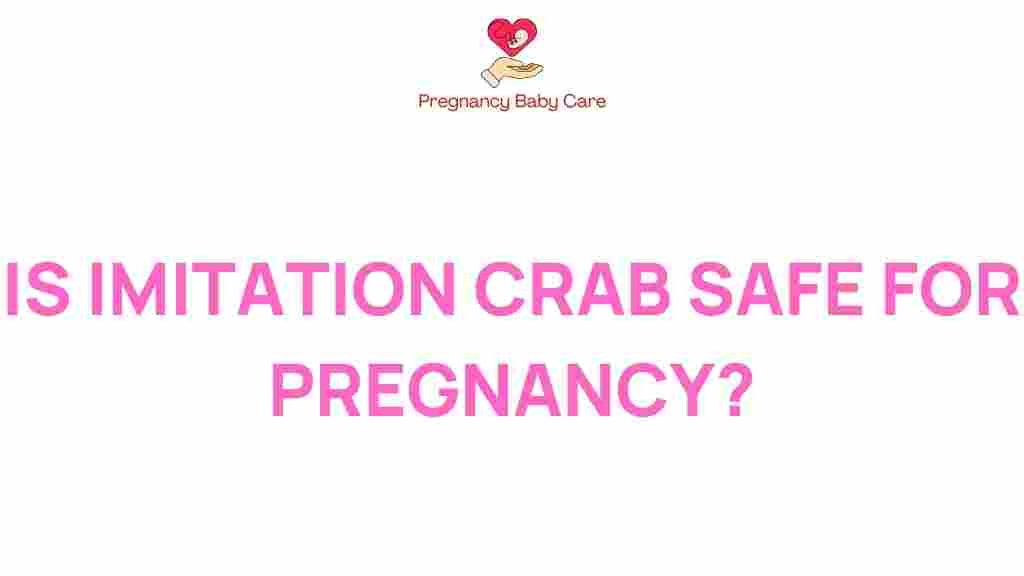Is Imitation Crab Safe for Pregnancy?
During pregnancy, every dietary choice becomes crucial for both maternal health and the developing fetus. One common concern among expectant mothers is seafood consumption, particularly when it comes to imitation crab. While imitation crab can be a tempting seafood alternative, many wonder about its safety during pregnancy. This article will delve into the nutritional aspects, health risks, and dietary choices regarding imitation crab and its suitability for pregnant women.
Understanding Imitation Crab
Imitation crab, also known as surimi, is a processed seafood product made from fish, typically Alaskan pollock, that has been deboned, washed, and processed into a paste. This paste is then flavored and colored to resemble crab meat. While imitation crab is popular in various dishes, understanding its composition is essential for evaluating its safety during pregnancy.
Nutritional Profile of Imitation Crab
Imitation crab is often considered a seafood alternative due to its lower cost and accessibility. Here’s a quick look at its nutritional profile:
- Calories: Approximately 80 calories per 3-ounce serving
- Protein: About 15 grams
- Fat: Less than 1 gram
- Sodium: Can be high, averaging around 800 mg
- Carbohydrates: Usually around 5 grams
While imitation crab is low in fat and calories, it is essential to note that it can be high in sodium. Pregnant women are often advised to monitor their sodium intake to avoid complications such as high blood pressure.
Health Risks Associated with Imitation Crab
When considering imitation crab within the context of pregnancy safety, several factors need to be examined:
- Mercury Levels: One of the main concerns with seafood is mercury exposure. Imitation crab is generally made from low-mercury fish, making it a safer option compared to many other seafood types.
- Allergens: Some imitation crab products may contain allergens like shellfish or gluten. Pregnant women should check labels carefully if they have known allergies.
- Preservatives and Additives: Imitation crab may contain preservatives and artificial ingredients that could pose health risks. Always choose products with fewer additives.
- Sodium Content: As mentioned earlier, the high sodium content can lead to health issues during pregnancy, such as hypertension. Opting for low-sodium versions, if available, is advisable.
Imitation Crab in Prenatal Care
Including imitation crab in your diet during pregnancy can provide some nutritional benefits, but moderation is key. Here are some tips for incorporating imitation crab safely:
- Check Labels: Always read the nutritional information and ingredient list to assess the safety and quality of the product.
- Limit Consumption: Consume imitation crab in moderation. It can be part of a balanced diet, but it shouldn’t be the main seafood source.
- Pair with Healthy Ingredients: Combine imitation crab with fresh vegetables, whole grains, or healthy fats to create a balanced meal.
Seafood Alternatives During Pregnancy
If you’re looking for seafood alternatives to imitation crab, there are several options available that are also safe and nutritious during pregnancy:
- Cooked Shrimp: Low in mercury and rich in protein, cooked shrimp can be a great addition to your diet.
- Salmon: Packed with omega-3 fatty acids, salmon is beneficial for both maternal and fetal health.
- Canned Light Tuna: It has lower mercury levels compared to other tuna varieties and can be included in moderation.
- Other Seafood: Fish like tilapia, haddock, and cod are generally safe options when properly cooked.
Maternal Health and Dietary Choices
Making informed dietary choices is vital during pregnancy. Here are some factors to consider when assessing your diet:
- Variety: Eating a variety of foods ensures you receive essential nutrients for fetal development.
- Cooking Methods: Always cook seafood thoroughly to eliminate harmful bacteria or viruses.
- Consult Healthcare Providers: Always discuss your dietary choices with your healthcare provider during prenatal care for personalized advice.
Troubleshooting Dietary Concerns
If you experience any issues related to your diet during pregnancy, consider the following troubleshooting tips:
- Digestive Issues: If imitation crab or other seafood causes digestive discomfort, consider alternatives high in fiber.
- Allergic Reactions: If you suspect an allergy to imitation crab, discontinue use and consult with a healthcare professional.
- High Sodium Concerns: If sodium intake is a concern, switch to fresh or unprocessed seafood options.
Conclusion
In conclusion, imitation crab can be a safe seafood alternative during pregnancy if consumed in moderation and with careful consideration of its nutritional profile and health risks. While it offers some benefits, it is crucial to be aware of its sodium content and choose high-quality products. Always consult with your healthcare provider to ensure your dietary choices align with your prenatal care goals.
For more information on safe seafood consumption during pregnancy, check out this FDA seafood guidance document. Additionally, for more tips on healthy eating during pregnancy, visit our healthy pregnancy resource page.
This article is in the category Pregnancy and created by PregnancyBabyCare Team
